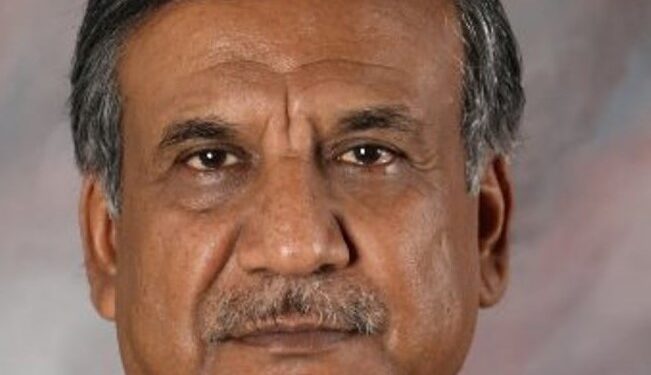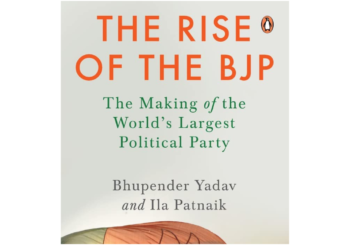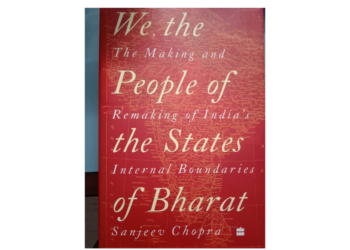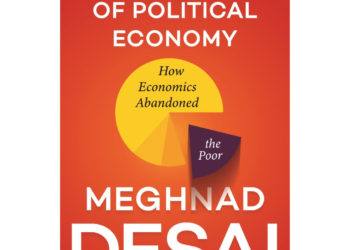This first-person account of an IAS officer from a family of civil servants makes for rivetting reading on India’s problems, challenges and achievements
BY DR SANJEEV CHOPRA
This could have been the alternate title to Deepak Gupta’s autobiographical foray, Small Things Matter, as he takes us on the journey of his personal and professional life in a frank and candid conversation which also captures the life of a typical civil services family in India in the post-Independence era!

Author: Deepak Gupta
A caveat is in order. I have had the privilege of knowing the author over the last two decades, have worked with his elder brother, Madhukar Gupta, interacted with his Indian Foreign Service brother, Harsh Gupta, and launched the book on their legendary father, Anand Swaroop Gupta, Caught by The Police, at the very first edition of Valley of Words at Dehradun in 2017. This was the most well attended session in the festival and there was literally no space in the hall where the discussion took place. The author’s book on the history of the IAS too has been a bestseller, and he has been invited to many a literature festival and discussion forum to share his thoughts.
Let’s now move on to this eminently readable book with the subtitle “Governance Experiences of an IAS Officer”. As this was written during the time of Covid, there is perhaps a little despondency, and a sense of not being able to do as well as China on a range of parameters— from solar energy to armaments, of not being able to achieve superpower status and about issues like employment, migration, mounds of untreated waste—but India’s collective efforts at managing the Covid pandemic and the dedication and commitment of the frontline workers, especially those in health, sanitation, police and district administration should have also found a reference. That India was able to produce PPE kits and vaccines, not just for itself but also for export, speaks volumes about the ability of the nation to rise to any challenge. This does not take away from Gupta’s argument that if we can pay equal attention to things which do not make headline news, then India would indeed become a paramount country. In fact, the following lines sum up the essence of the book: “…the work of government and administration takes place, and noticed in everyday transactions and exchanges. It is the small boring things that make an impact and which make for effective governance – garbage collected, road paved, drain cleaned; ATM functional; tax refunded after transparent assessment; license/passports/registration done without hassles, and so on.”
The devil lies in the details and implementation. In other words, while we have to keep goals like the $5 trillion economy as lodestars, we should not lose track of the here and now, the immediate—for it is all these trifling details which will lead us to perfection.
Dedicated to his illustrious father , Dr Anand Swaroop Gupta, a polyglot who could recite the Gita, Ghalib and Shakespeare with equal facility, the book talks of a fairy tale existence in wellappointed government bungalows—first in Shimla and then in Lucknow, family picnics and games, and the celebration of festivals.
That he was destined for the civil services comes to the fore on account of a series of coincidences: diphtheria before the IIT entrance tests, rejection of a job in a British bank with a two-year training stint in England, admission to St Stephen’s College under the sports quota besides missing out on the Rhodes Scholarship and the French studies fellowship. And thus, in spite of astrological predictions to the contrary, the author joined the LBS National Academy of Administration as a probationer (as the Officer Trainees were then called) and won his spurs as the best probationer of the batch of 1974!
Allotted to the Bihar cadre, he had his first brush with the ‘stubborn feudalism’ and complete breakdown of systems— both in the public and private sectors—on the journeys by train, bus and taxi. The positive news is that all three have turned around in the last four decades—even the Garib Rath which ferries migrant labour to Punjab is air conditioned and one can hire a cab on a mobile app in most district towns of Bihar and Jharkhand. This is not to say that all problems have been resolved but absolute poverty and deprivation are now things of the past. And all this has happened because of the ‘small changes and system improvements’ brought in by officers like the author, and many more. True, the administrative system could have fared better, but one has to understand that India was in a process of soil churn, and hopefully, the new paradigm of governance and public service, with its focus on delivery— from cooking gas to PDS to agriculture insurance and DBT(direct benefit transfer) —would cut individual discretion and make transactions more transparent.
To an eternal, or if one may say, wishful optimist like me, the story also marks the positive change in our ability to bring about incremental improvements in everything we do from the syllabi of the CSE to the training at the Academy and the ongoing dialogue of ministries with the research centres at the Academy, and the transformation of NITI as a think tank, and the focus on aspirational districts. The author does well to mark out individuals like Rajeev Gauba, Cabinet Secretary; Amitabh Kant, Sherpa to PM for the G20; U.S. Awasthi, MD, IFFCO; Dr K. Kasturirangan of ISRO; and Ashok Mukhopadhaya and Dr Shruti Sahgal from the voluntary sector for having made an actual difference on the ground. We should do more to celebrate the individual and institutional contributions of these persons.
The storyline which weaves the book into 25 chapters is also a journey into the personal and professional life of Gupta. While most of the titles give an idea of what to expect, the juxtaposition of a stint in Belgium with the backwaters of Bihar shows how diverse, complex, uncertain and challenging the life of an IAS officer is. Reading through chapters as varied as on health systems and neglect of solar energy shows how the author puts across his views with intended pun and punch, as for example when he told the secretaries of petroleum, power and coal that although “solar got only one minute in a one-hour conversation, by 2030, solar would get fifty-nine, as the rest would have fossilized”! He talks about almost every issue that the country faces—from menstrual hygiene to the national database on pendency in judicial courts, EODB and bio-energy.
Reading his book leaves one with tremendous energy and positive vibes. India is now set to take pride of place in the comity of nations.
The fact that we have moved to a rights-based regimen in which the Rights to Work, Food, Education and Information have become the leitmotif of administration at the district level is an important milestone in the history of our nation. The contribution of the author in this transformation of the country is indeed second to none—and the book promises to be a good read, not just because pf the biographical sketch but became of the issues, concerns and possible solutions suggested by him. The book will be a most valuable addition to the ‘Making of a Nation’ section in the Gandhi Smriti Library at the Lal Bahadur Shastri National Academy of Administration, and certainly makes for inspirational reading for all aspirants preparing for the civil services, and those who are a part of it.
(The reviewer is a historian, public policy analyst, and Festival Director at the Valley of Words, Dehradun). Until recently, he was the Director of the Lal Bahadur Shastri National Academy of Administration, Mussoorie.)








